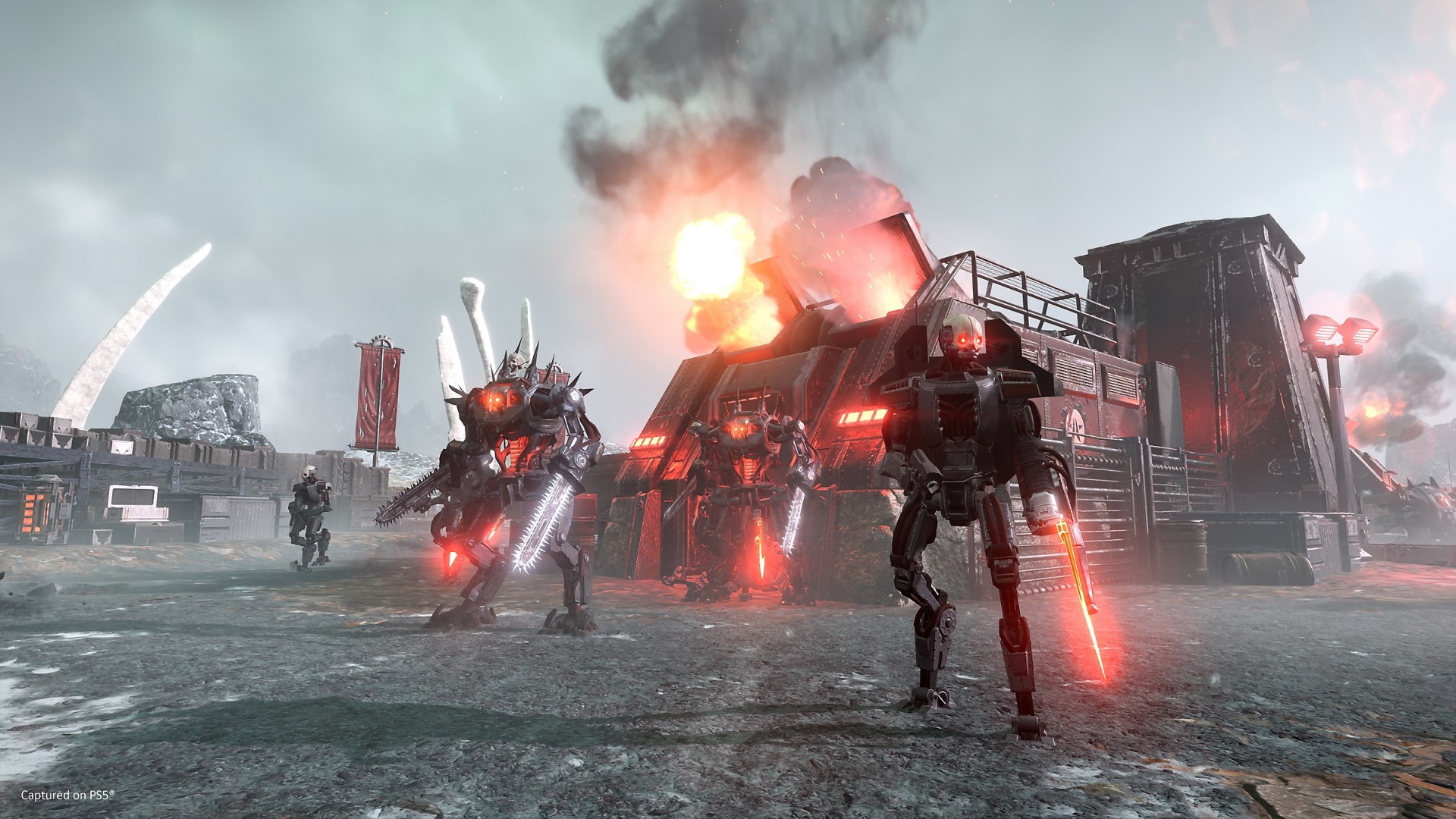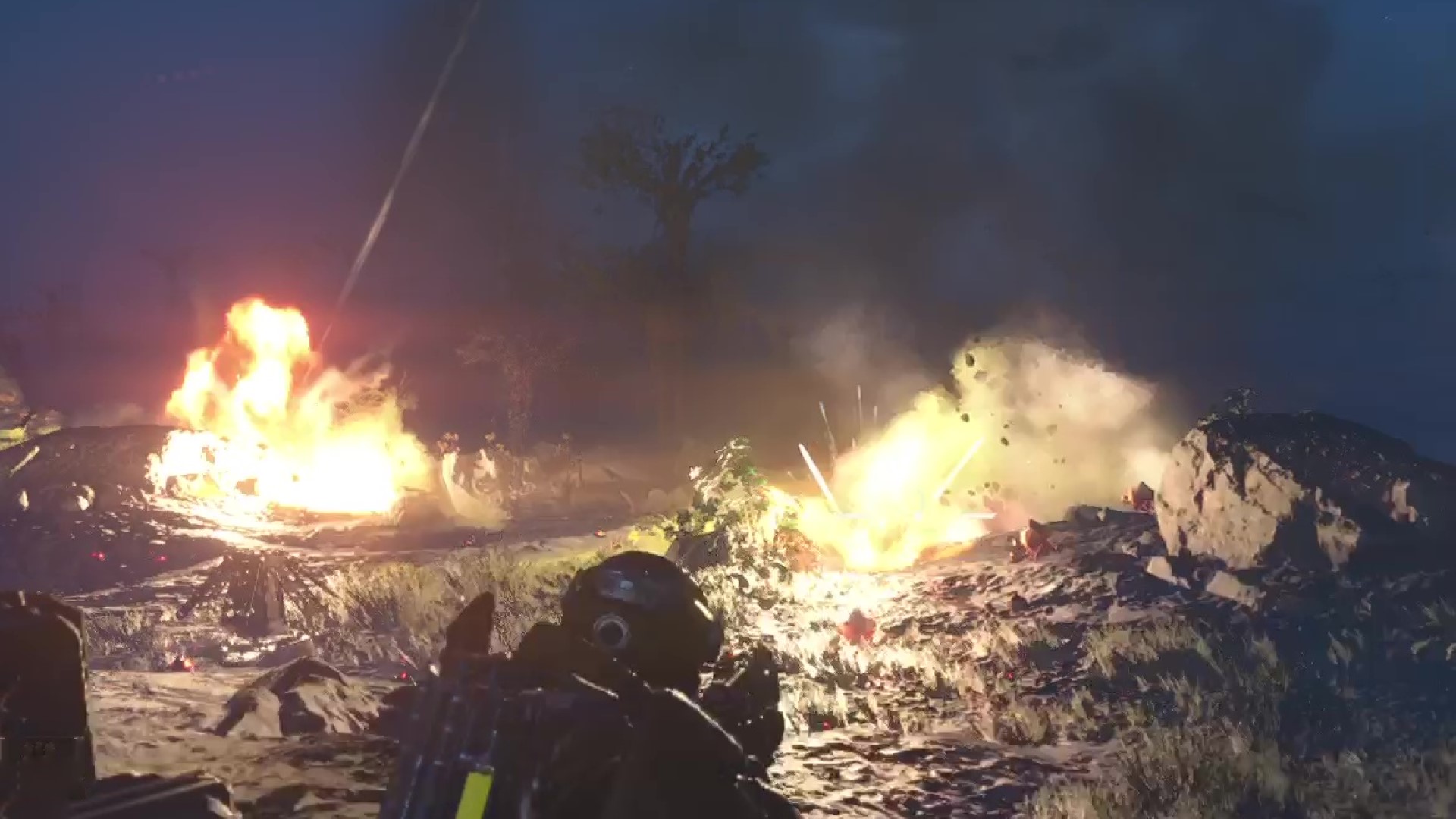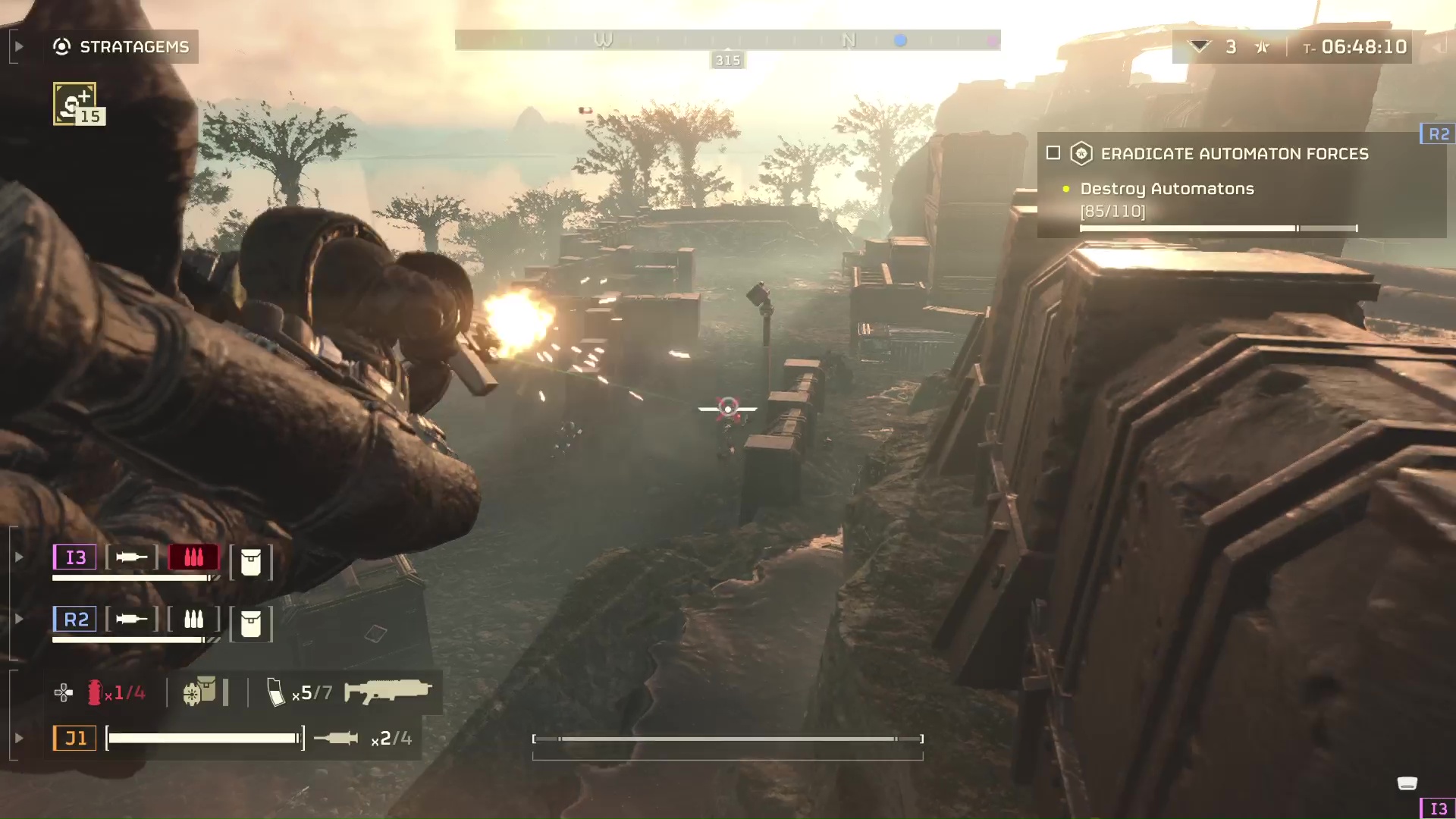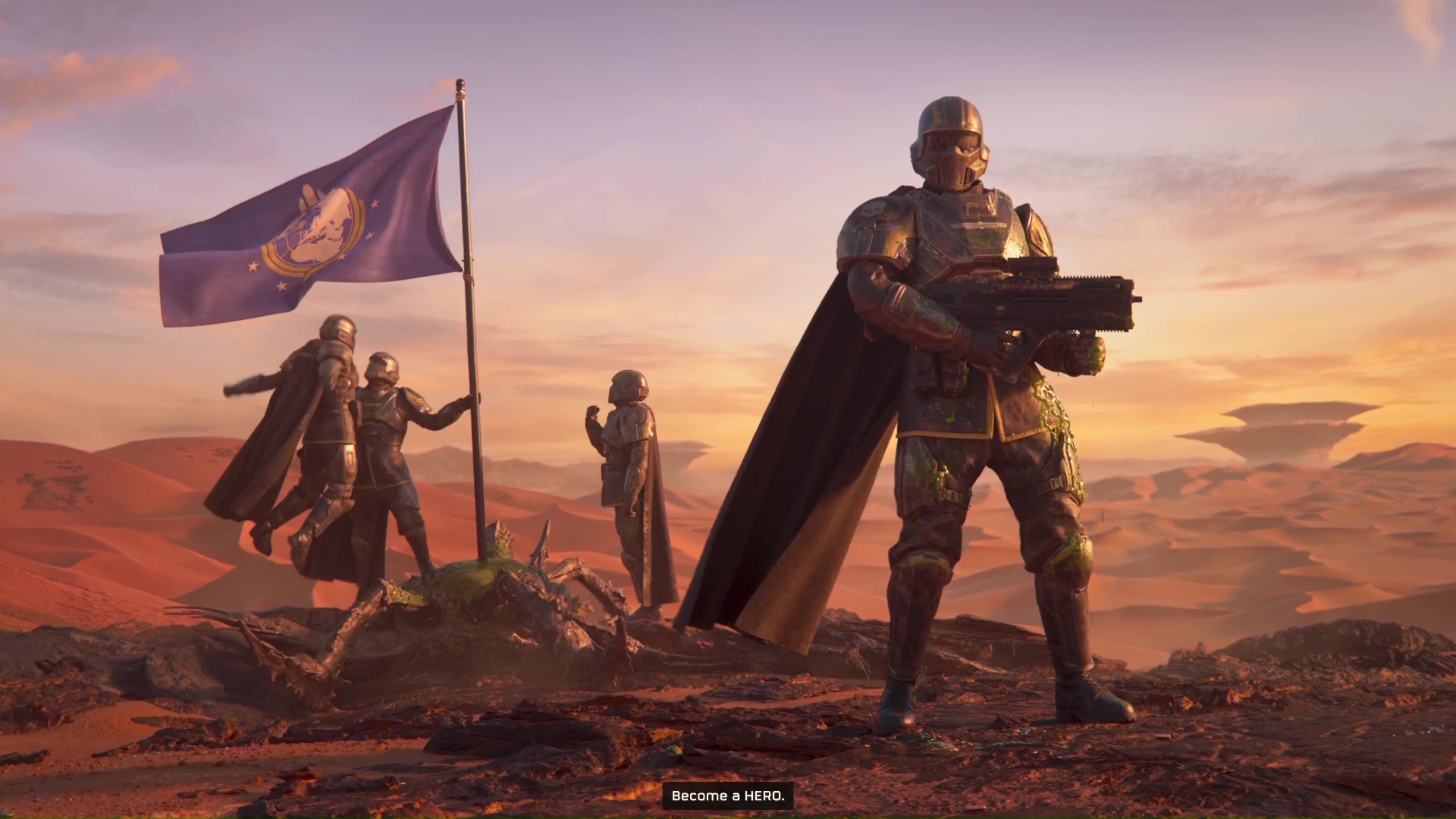Why Helldivers 2 is the best RPG of 2024
Opinion | What's more freeing than shouting at the top of your lungs into a headset on a server full of strangers?

We're lying in a crater on a barren godless planet, low on ammo, watching glumly as an army of ravenous space insects heads towards our position. In this bout of Helldivers 2, all, it seems, is lost. But then the cool down on one of my co-player's orbital gatling barrage expires. They target the horde and call in a strike. Within seconds the sky becomes a luminous orange inferno as dozens of giant space ants are instantly vaporized. "Eat democracy!" someone yells. "For liberty!" screams someone else. I've been playing with these strangers for around two hours and we no longer need the in-game victory dialogue. We make our own.
Helldivers 2, like its very clear inspiration, the 1997 movie Starship Troopers, is a brilliant meta-textual satire on overt patriotism, colonialism and political propaganda. The game sets up its vision of an insanely militarized society right from the outset via the darkly hilarious Helldivers recruitment advert, created by Stockholm-based VFX studio Goodbye Kansas. This intro closely resembles the commercials that play throughout Paul Verhopeven's sci-fi film classic, and which intersect with the action of the film, so that the characters become mere actors in an ongoing advertisement. And it's all brilliant.
Starship troupers


Helldivers 2 isn't just good co-op, it's a masterclass in designing comedy games
Just like Starship Troopers, Helldivers 2 manipulates its format in clever ways to point out the ludicrous nature of its own fiction. Visit the game's Superstore section, for example, and the armored suits and helmets are all displayed with enthusiastic customer reviews, like items on Amazon. "Resistant even against the most gross bug goo" says one, "I bought this for my husband and he loves it" says another. Some purchasers seem to be soldiers, others seem to be civilians buying replica items – the lines between fiction and "reality" are constantly blurred. Similarly, the items in the Ship Module menu, where players buy buffs to their air support and robotics equipment, are accompanied by daft descriptions that parody the high-tech jargon and solemn narratives of hard sci-fi video games. One of the possible updates for the orbital cannons is "more guns". "After years of research into improving the Super Destroyer's firepower, the Ministry of Science concluded that the most effective method was adding more guns." Brilliant.
What Helldivers 2 does is invite players to take part as performers. The most fun I've had in the game has been with players who have quite literally role-played their way through the missions, spouting their own dumb patriotic dialogue, and I honestly think that's what the designers want. In this game we're not inhabiting the characters, the avatars on-screen are just automatons – they have no backstory, no biography, no relationships with each other; their very interchangeability is gleefully expressed whenever your soldier dies and a replacement is sent in. And then, when you get back to your ship after a mission, the transporter shuffles through a line up of identical arrival pods, like some factory production line, until your character pops out, like a gacha toy. The story is you and your squad mates. "Don't go it alone" says one loading screen tip, "Join a squad in order to unleash maximum liberation!". Nothing is real. We're not heroic space marines, we're actors portraying heroic space marines in a ridiculous B-movie.
Helldivers 2 is part of a long tradition of video games that openly revel in their game-ness and that want players to acknowledge they are performing in a role. The Metal Gear Solid series constantly draws attention to artifice, with boss character Psycho Mantis famously checking the player's PlayStation memory card, while Raiden in MGS2 effectively is the player, performing tasks in the game that he has only ever tried in a virtual reality simulation. Rockstar's stealth horror adventure Manhunt has the player character performing murders for a sociopathic Hollywood director in what could be a snuff film, and Spec Ops: The Line is a military shooter about how problematic military shooters are, demanding the player questions everything they do as the "reality" of the situation gradually falls apart.

"I'm noticing that, as the game goes on, voice comms are quietening down, and people are un-reflexively taking on their roles as space marines, just like they might do in Halo. I think that's kind of a shame."
The online multiplayer horror game Dead By Daylight is likewise at its best when the player taking on the role of the killer really gets into character – when Michael Myers stands watching his victims from a distance before pouncing. The controversial psychological thriller Heavy Rain subtly invites players to be actors and to choreograph the scenes, allowing us to pose the lead character in ways that resemble cinematic staging. The massive artificiality of the world is exposed by the ridiculous impossible plot twist. The ultimate example, though, might be Sea of Thieves, a game that encourages you to self-consciously act as a pirate, via its musical instruments and vomit-inducing grog, neither of which have a useful role in the actual gameplay.
Sure, you can just play Helldivers 2 straight, as a popcorn space-blaster – and sure enough, I'm noticing that, as the game goes on, voice comms are quietening down, and people are un-reflexively taking on their roles as space marines, talking only to make plans, just like they might do in Halo. I think that's kind of a shame. I liked pretending to be a cog in a futuristic fascist empire, glorying over the "democracy" I've just brought to an inhospitable lump of ice in the middle of space. It was fun. I think games should ask questions about how we as players relate to the characters and worlds being depicted. I think "role playing" should mean something more than simply a game type where you take a character class, level up and tick off branches on a skill tree.
Sign up to the GamesRadar+ Newsletter
Weekly digests, tales from the communities you love, and more
So if you haven't done it yet, the next time you bomb an automaton factory into scrap metal, yell "And that's for democracy!" over the voice coms. Believe me, you'll feel better – you'll be doing your part.
Helldivers 2 review: "A fiercely challenging and visually breathtaking cooperative shooter"
Keith Stuart is an experienced journalist and editor. While Keith's byline can often be found here at GamesRadar+, where he writes about video games and the business that surrounds them, you'll most often find his words on how gaming intersects with technology and digital culture over at The Guardian. He's also the author of best-selling and critically acclaimed books, such as 'A Boy Made of Blocks', 'Days of Wonder', and 'The Frequency of Us'.


